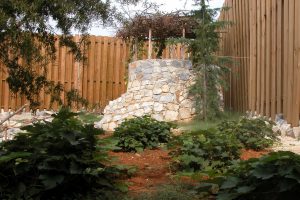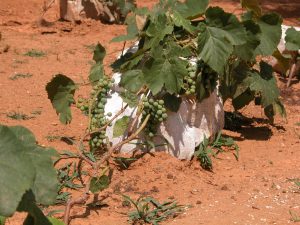The analogy of the vinedresser and the vineyard, found in John 15, is the second most common analogy used by biblical writers to speak of God’s relationship to persons. The most common, of course, is that of the shepherd and the sheep. Both these analogies are found throughout the Old Testament. Because there is an abiding relationship between a vine and its branches, Jesus uses this illustration at the Last Supper to help his disciples understand their living relationship with God.
Jesus begins, “I am the real vine, and my father is the vinedresser. Every branch in me that bears no real fruit, he takes away; and every branch that does bear fruit, he prunes to make it bear even more fruit. You are pruned already by means of the word I have spoken to you. Remain in me, as I in you. As a branch cannot bear fruit all by itself, unless it remains part of the vine, neither can you, unless you remain in me. I am the vine, you are the branches. Whoever remains in me, with me in him, bears fruit in plenty; for cut off from me you can do nothing.” (John 15:1-5)
How do we get sweet grapes, sweet fruit in our lives from our abiding relationship with God in Christ? Abiding is not a sentimental “my Jesus and me” concept. It takes a lot of energy for a plant, particularly a vine, to pull moisture from deep within the earth, against gravity, up to its branches. A vine, planted in the ground, going in many stories up the side of a building to a roof top, still pulls its moisture from the ground. It requires real effort to abide in the vine, but the fruit that is received is hard to describe.
The Last Supper, the setting of Jesus’ saying, was the one meal of the year where there was more fruit of the vine on the table than any other. John wants us to know that the saying of the vine and its branches is at the Passover season when everyone is celebrating. The fruit of the vine is a symbol of joy.
One of the main analogies that would have come to the disciples’ minds for any story about the vine is found in Isaiah, Chapter 5. The prophet Isaiah speaks about a vinedresser who had a vineyard on a fertile hillside. There are so many rocks in Judah, where this story is set, that they have to be cleared before the planting can begin. The rocks are piled up in rows all around. For a vineyard you need walls and a watchtower. Every year, with the onset of the winter rains, the walls are continuously falling and must be restored. The vineyards are built on slopes, and each wall serves as a terrace for the next wall. Normally the vinedresser tries to find a spot where the natural rock angles down so he can have a place to step on the grapes, letting the juice run down into a collection vat below.
 The vinedresser in Isaiah has a vineyard on a fertile hill. He has cleared it of stones, built a wall around it, and constructed a watchtower in the center of the vineyard. During the vintage season the vinedresser and his family sleep in the watchtower at night. They must guard the grapes to keep people from stealing them.
The vinedresser in Isaiah has a vineyard on a fertile hill. He has cleared it of stones, built a wall around it, and constructed a watchtower in the center of the vineyard. During the vintage season the vinedresser and his family sleep in the watchtower at night. They must guard the grapes to keep people from stealing them.
There is so much care that goes into the vineyard. There must be a wall to keep animals out and to keep people from tromping the soil down after it has been loosened. Then the watchtower must be built and manned to guard it. You could not have two more intense illustrations of the care of God for us than that of the shepherd for the flock and that of the vinedresser for the vineyard. There is so much work involved.
The vinedresser in Isaiah anticipated sweet grapes, but sour grapes were all that he got. So he says, “What should I do with you, vineyard of Judah? I will remove the wall and it will be trampled upon. I will no longer guard the grapes. I will stop pruning and hoeing and it will be overgrown with briar and thistle.” (Isaiah 5:5-6)
At first this parable in Isaiah sounds cruel and harsh. what you need to know is that the only difference between a sweet grape and a sour grape is cultivation. If you do not loosen the soil and put a wall around the vineyard to keep animals and people out, there will be no sweet grapes. There is little rain in Judah. Keeping the soil loose is what allows the small amount of rain there is to seep into the earth and produce large sweet grapes. A vine out in the wild, which does not have the soil loosened around it and does not have a wall to protect it, will not produce sweet grapes, only small sour ones.
For Isaiah, the vinedresser is the Lord. the vineyard is the present planting, the people of Judah. God looked for the people to practice justice which was going to be sweet. But oppression, sour grapes that put your teeth on edge, was all that the Lord found. The Assyrians came through Judah and trampled it. Forty-six villages had their walls torn down. The children of Judah did not want a cultivated nation. The did not want to be consecrated by God to be different, to be a light to the pagans. They wanted to be like all of the other nations. What was their punishment? It was captivity to the other nations. As punishment in scripture God often gives people what they want. The vineyard in Israel wanted sour, uncultivated grapes.
We find another example of God’s giving the people what they want in the manna story in Exodus. The Israelites had manna for breakfast, manna for lunch, and manna for dinner. They complained to Moses that they wanted meat. So, the Lord sent quail for breakfast, quail for lunch, and quail for dinner. The people came back to Moses saying, “We have been thinking this over and we will take the manna back.”
How do we get sweet grapes? How would the biblical people have understood Jesus’ speaking about the vine and the importance of its remaining tied to its branches? How can we apply this parable to our life today, to our abiding relationship with god, to our prayer relationship to God?
 In the Greek language, the phrase that is translated “take away” is the same as that which is translated “lift up.” So with the scripture, “Any branch that bears not fruit,” the translator has to decide whether to use “take away” or “lift up.” You can’t tell which way it should be translated into another language. It helps to understand that in biblical times the vines lay flat on the ground. When there was too much rain the vines began to mold and rot. Near each vine the vinedresser kept a rock or two. You might say that the vinedresser knew each vine by name and knew how it was doing. If it were not bearing fruit, he would lift it up to air it out and keep it from getting rotten. Sometimes a plant had five or six stones nearby because the plant had a history of getting rotten. the vinedresser remembered from season to season how each vine had done and a new vine would not grow unless the vinedresser lifted it up.
In the Greek language, the phrase that is translated “take away” is the same as that which is translated “lift up.” So with the scripture, “Any branch that bears not fruit,” the translator has to decide whether to use “take away” or “lift up.” You can’t tell which way it should be translated into another language. It helps to understand that in biblical times the vines lay flat on the ground. When there was too much rain the vines began to mold and rot. Near each vine the vinedresser kept a rock or two. You might say that the vinedresser knew each vine by name and knew how it was doing. If it were not bearing fruit, he would lift it up to air it out and keep it from getting rotten. Sometimes a plant had five or six stones nearby because the plant had a history of getting rotten. the vinedresser remembered from season to season how each vine had done and a new vine would not grow unless the vinedresser lifted it up.
Rain is a blessing in the bible; sun is a curse. When the Lord causes the rain to fall on the just and the unjust alike, he blesses everyone. When he causes the sun to shine on the just and the unjust alike, everyone is going to have some dry times and some famine as well. sometimes you and I have too much blessing, too much rain, and we get rotten. We need to dry out a bit so the vinedresser lifts us up.
One of the reasons that our prayers may not be answered is because we ask for too much comfort and ease, for things that make us rotten. The vinedresser needs to lift us up. The scripture, “Any branch that bears not fruit, I will take away,” might be better translated “Any branch that bears not fruit, I will lift up.” God lifts us up to air us out and we can begin to bear fruit again
